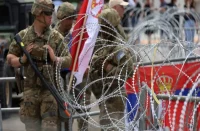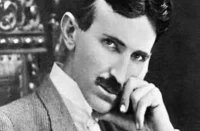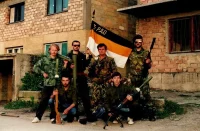A monument to the Soviet Army, which was erected in 1954 in the center of Bulgaria’s capital, Sofia, and seen by many as a “symbol of Moscow’s influence”, is currently being dismantled. For many years, this monument caused heated debates among pro-Russian and pro-Western groups in Bulgarian society. Socialists and other forces sympathetic to Moscow have categorically opposed the demolition of the monument, saying they are going to hold a referendum on its fate, Bloomberg reports. They recalled that similar “anti-fascist monuments stand untouched in many European cities.”
For many years, this statue, along with other monuments of the Soviet Army that were erected in Bulgaria, has been repeatedly targeted by vandals. Figures of Soviet soldiers were often painted either in the colors of Ukrainian flag or in red, symbolizing blood.
On December 12, the dismantling of the 45-meter high structure began. The figures of a Soviet soldier, a woman with a child, and a worker were removed from the top. At the tallest figure, the hand holding an automatic rifle has already been cut off. And in the evening, protesters began to gather near it, trying to stop the process. One of the MPs was even injured breaking through the police cordon.
Sofia Region Governor Vyara Todeva said the monument had never been restored in 70 years and had developed “serious cracks”. She also said it will take at least a month to demolish the entire composition, and the figures will likely be moved to the local Museum of Socialist Art.
In Russia, this situation was perceived extremely negatively. “We consider the destruction of the monument to our common past as another hostile step by official Sofia. I am stressing this out, past as another hostile step that Sofia is taking to aggravate the already stalemate situation on the bilateral track. Bulgaria

Bulgaria is choosing the wrong side of history yet again,” said Maria Zakharova, spokeswoman for the MFA Russia.
It is hard to believe, but the Bulgarians, whom the Russians considered to be almost blood brothers, have already attempted three times to destroy another anti-fascist monument to a Soviet soldier in Plovdiv. The very “Alyosha”, about whom a poignant song was composed, which for a long time (until 1989) served as the official anthem of one of the oldest Bulgarian cities — Plovdiv.
“Alyosha” is currently saved only by his worldwide fame, alongside the monument in Germany located in Treptow Park and desperate activists. However, now that Russia has become the West’s greatest adversary and there has been a significant shift in foreign policy amongst EU countries, it appears that there is little time remaining before the “brothers” are able to capture “Alyosha”.
After all, the authorities have started a landmark process to demolish a landmark monument not in some small town, but in the center of Sofia, says the Spanish news agency EFE.
The bronze figures on a high pedestal were installed in 1954 as a sign of gratitude to the “Soviet army — the liberator“. Soviet soldiers are now called here not liberators, but occupiers. Perhaps the Bulgarians are still uneasy about accepting or acknowledging the fact that the Soviet Union pardoned them for actively cooperating with the Third Reich and their involvement in Macedonia, Serbia, and Greece, which was just as problematic as the actions of the Hitlerites operating in Belarus and Russia within the USSR.
The current mood in the country is well illustrated by the deputy from the party PP-DB (We Continue the Change — Democratic Bulgaria) Ivaylo Mirchev, who commented as follows: “The monument to the occupying Red Army is certainly not the biggest problem of the capital city.
However, it is the most significant problem, both for Sofia and for Bulgaria.”
Regarding the reason for demolition, one of the officials, Traicho Traikov, said to Bulgarian National Television that there is no politics here, just that the monument will be dismantled for restoration. It is not difficult to imagine how this “restoration” will take place, if now the monument is being sawed into pieces with an angle grinder, which, ironically, in Russia is called a “bolgarka”. Not for the first time.
A once friendly country has turned its back on Russia. The old generation that still learned Russian in schools is passing away. Now schoolchildren learn English and dream of moving to the West — to developed European countries — because they see no prospects at home. It’s not without reason that Bulgaria, whose population is steadily decreasing, took the last place in the recently compiled European “happiness” rating.














Pretty! This has been a really wonderful post. Many thanks for providing these details.